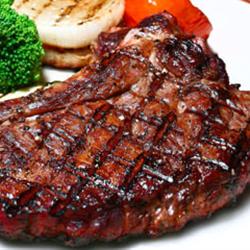Templeton Farm
Contact Us
Templeton Farm
3410 Center Road
East Montpelier, Vt. 05651
802-223-0169
802-461-5352
[email protected]
Templeton Farm
3410 Center Road
East Montpelier, Vt. 05651
802-223-0169
802-461-5352
[email protected]

Marinade (MAIR-uh-naid) is a savory acidic sauce in which food is soaked to enrich its flavor or to tenderize it. So, the purpose of a marinade is very similar to earlier centuries: to tenderize and flavor. Marinades typically consist of an acidic ingredient like vinegar, lemon juice, wine, plus oil and herbs or spices. Red meat marinades don't always include oil since the meat generally contains enough fat.
Marinate (MAIR-uh-nait) is a verb that means to steep food in a marinade. You are treating the meat like a sponge and having enabling the meat to absorb flavor.
Ratio Marinade To Meat:
A marinade should be thin enough in consistency to penetrate the meat. A general rule of marinade-to-meat ration is 1/2 cup of marinade per pound of meat. If you use a little more marinade, it will be OK.
Marinades vary from recipe to recipe but they generally contain three basic components - oils, acids, and seasonings:
Refrigerate When Marinating:
Always marinate in the refrigerator Never marinate at room temperature or outdoors when barbecuing as bacteria can quickly multiply on raw meat if it is warm.
Some older recipes call for marinating at room temperature. Do not follow this practice. Marinating at room temperature causes meat to enter the danger zone (between 40 degrees F. and 140 degrees F.) where bacteria multiply rapidly. If you recipe calls for marinating at room temperature, just increase the marinating time and marinate in the refrigerator.
Marinating Containers:
Do NOT marinate in a metal container since the acidic mixture can react with the metal. Marinate in a re-sealable plastic bag, or a sealable plastic container or glass container only. Turn meat occasionally so all sides are coated evenly with the marinade.
The easiest and less messy way to marinate meat is to use a re-sealable plastic bag. When your meat is marinated in a re-sealable bag and all of the air sealed out, the marinade completely surrounds the meat. This dramatically reduces the amount of marinade necessary and it also promotes an even marinate of your meat from top to bottom and allows maximum penetration from all sides.
Approximate Marinating Times:
Marinating times vary depending on the type, cut, and size of the meat. All meats have a refrigerated shelf life and marinating does not extend that shelf life (shelf life includes the day of purchase and thawing time). Frozen meat will not absorb a marinade, so don't waste your time.
| Type of Meat | Cut of Meat | Approximate Marinating Time |
| Lamb, Beef, and Pork | Steaks, Chops | 2 to 4 hours |
| Beef Flank Steak | 2 hours to overnight | |
| Whole Roast | 4 to 6 hours (or overnight) | |
| Brisket | 24 hours | |
| Poultry | Chicken Breasts, boneless, skinless Chicken Thighs, boneless, skinless Duck Breast, boneless, skinless | 2 hours to overnight |
| Whole Roast or Chicken | 4 to 6 hours (or overnight) | |
| Seafood | Shrimp Scallops |
15 to 30 minutes 5 minutes |
| Fish | Steaks and Fillets | 15 to 30 minutes |
Reusing Marinades:
Discard any unused marinate. If you plan to use some of the marinade as a sauce on the cooked food, reserve a portion separately before adding the raw meat, poultry, or seafood. To avoid bacterial contamination of cooked meat, make two batches of marinade. Use one batch on the raw meat before grilling, then toss. Use a fresh batch as a finishing sauce or dip after the meat is fully cooked.
Because the marinade will have been in contact with raw meat juices, if you do want to use some of the marinade, boil the marinade first to destroy any harmful bacteria for at least 5 minutes before using it to baste the cooking meat or serving it as a sauce. Food borne bacteria dies at 165 degrees F.